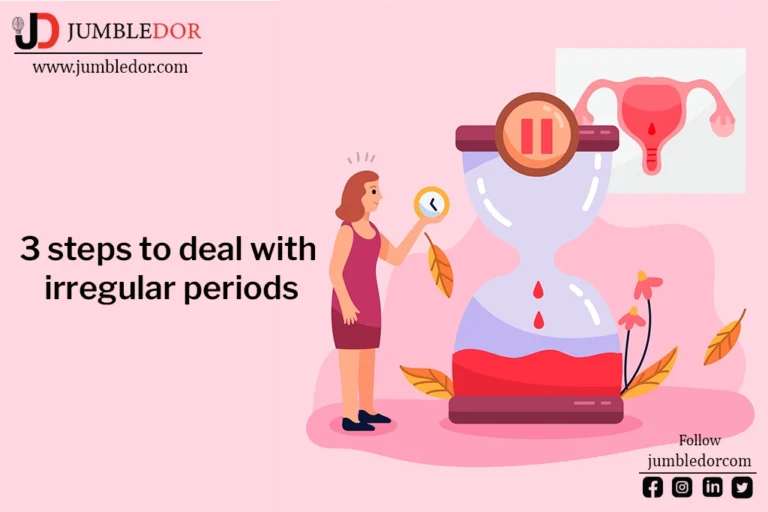Your periods could be arriving any minute. It could be around the corner or it could delay its arrival this time. We can’t be sure about when it’ll arrive, or how long it’ll last. This time maybe it’ll last only 4 days, or maybe go on until about 10-12 days. It’s all very uncertain and frustrating, isn’t it? These irregular periods become inconvenient for us and make our day-to-day life more stressful, and irritating. The causes of irregular periods could vary from various factors, such as stress, hormonal imbalances, weight fluctuations, and medical conditions.
And whether we’re not sure about its arrival and duration, we do know for sure what the symptoms of irregular periods will be. Cramps, mood swings, weird cravings, anxiety….need I mention any more? But don’t you worry, because we’ve got the ultimate solution to make irregular periods a thing of the past. But before that let us understand the basics of irregular periods.
What are Irregular periods?
Irregular periods refer to menstrual cycles that are unpredictable or vary in length. This means that a woman may experience changes in the duration, timing, or flow of her menstrual cycle, which can cause discomfort and impact fertility.
Causes of irregular periods:
Causes of Irregular periods can include hormonal imbalances, stress, excessive exercise, and certain medications.
Symptoms of irregular periods:
Symptoms of this condition include infrequent periods, heavy or prolonged bleeding, or unpredictable bleeding. Irregular periods can also cause fertility issues and may be a sign of underlying health problems, such as polycystic ovary syndrome or thyroid dysfunction.
Also read: 3 Steps for to deal with PCOS (Polycystic Ovary Syndrome)
Managing Irregular periods:
With just the three simple steps mentioned below, you’ll be able to deal with irregular periods, kick those symptoms to the curb and rock your period like a boss! Say goodbye to the period blues and hello to period positivity!
Step 1: Have a healthy balanced diet
One of the most important things you can do to manage your irregular periods and regulate your menstrual cycle is to eat a healthy and balanced diet. Eat a variety of foods like lean proteins, fruits, whole grains, vegetables, and healthy fats. Maintaining proper hydration levels by consuming ample amounts of water is equally crucial.
Eating a healthy diet can help regulate your hormones and improve your overall health, which can lead to more regular periods. Some foods that can help regulate your menstrual cycle include:
1. Leafy greens like spinach and kale
2. Whole grains like oats, brown rice, and quinoa
3. Fruits like berries, apples, and oranges
4. Lean proteins like chicken, fish, and tofu
5. Healthy fats like nuts, olive oil, and avocado
On the other hand, it’s best to avoid or limit foods that can disrupt your hormones and menstrual cycle, such as processed foods, sugary drinks, alcohol, caffeine, dairy products (for some women).
If you’re struggling with irregular periods, making some changes to your diet can be a great place to start.
Step 2: Manage stress
Stress can have an impact on your menstrual cycle as well. When you’re under stress, your body produces more of the hormone cortisol, which can disrupt your hormonal balance and cause irregular periods.
It’s important to find healthy ways to relax and unwind for managing stress. This might include:
Exercise
Physical activity can help reduce stress and improve your overall health. One should strive to engage in moderate exercise for a minimum of 30 minutes on most days of the week.
Meditation or mindfulness
Practising mindfulness or meditation can help you manage stress and improve your mental health.
Therapy
Talking to a mental health professional can help you manage stress and improve your overall well-being.
By finding healthy ways to manage stress, you may be able to reduce the frequency of your irregular periods and improve your overall quality of life.
Step 3: Visit your doctor
If your periods are consistently irregular or you’re experiencing other symptoms like heavy bleeding or pelvic pain, it’s important to visit your doctor. Irregular periods can be a sign of underlying health issues like polycystic ovary syndrome (PCOS), thyroid disorders, or endometriosis.
Your doctor can perform a physical exam, order blood tests, or perform other diagnostic tests to determine the cause of your irregular periods. They can also recommend treatment options based on your specific needs.
In conclusion, dealing with irregular periods can be challenging, but taking these three steps can help you manage your symptoms, improve your overall health and have a healthy menstrual cycle. By eating a healthy diet, managing stress, and visiting your doctor, you can work towards managing your irregular periods and a happier, healthier you.


